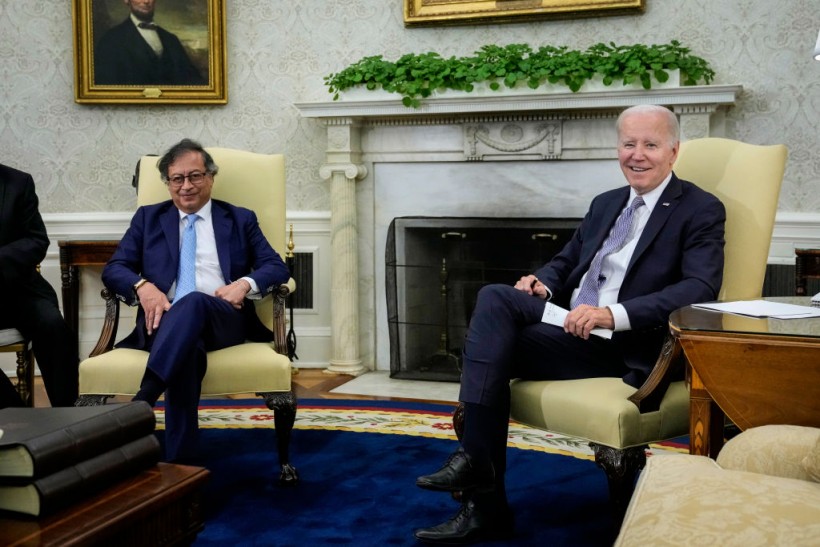Joe Biden Meets Colombia's Gustavo Petro at the White House

Despite their disagreements on U.S. drug policy and Venezuela, President Joe Biden welcomed Colombia President Gustavo Petro to the White House on Thursday for talks.
The two leaders discussed ways to further collaborate on climate change, migration, and energy policy, AP reports.
The leaders attempted to keep the conversation on points of agreement during remarks they made to reporters before the Oval Office meeting, such as the need to strengthen their democracies and develop economies that are less dependent on carbon-based energy sources.
"We are going down the same river, a river that leads us to ever-greater democracy and ever-greater freedom," Petro said, adding that "We have a common agenda and a lot of work to do."
Biden said the countries all wanted to make the Western Hemisphere "united, equal, democratic, and economically successful." He described Colombia as "the key to the hemisphere."
The two made light of their respective ages, with Biden at 80 being the oldest U.S. president in history and Petro turning 63 on Wednesday. However, their conversation in front of the cameras seemed to skim over the widening divides between Washington and Bogota.
In a speech to the United Nations last year, Petro harshly denounced U.S.-led efforts to restrict cocaine, arguing that oil consumption supported by "global powers" is more harmful than cocaine and that the "war on drugs has failed."
READ NEXT: Colombia President Gustavo Petro to Meet With Joe Biden at the White House
Joe Biden Says U.S. Will Help Colombia Through Regional Partners
President Joe Biden said they are working closely with regional partners to help Colombia tackle this problem, per Reuters.
He thanked Petro, a former member of the urban guerrilla organization M-19, for his "outspoken and strong commitment to peace and human rights."
With the help of negotiations or surrender agreements, Petro has pledged to end the six-decade violence in Colombia that has claimed the lives of at least 450,000 people.
"I believe that humankind in the Americas may well have the greatest potential for democracy and freedom," Petro said through an interpreter.
Petro has criticized the U.S.-led war on drugs as a failure and advocated for a new global strategy. His administration has promoted the arrest of major drug traffickers as the means to combat drug gangs rather than the elimination of coca.
"I asked for a bit more help on (interdiction of drugs); we need more boats, more tenders, more drones," Petro told reporters after the meeting.
During his discussion with Biden, Petro, whose birthday was on Wednesday, joked that being 63 years old in this generation was like being 40 years old in the "old" generation.
"I fully subscribe to that," said Joe Biden.
Colombia and Cocaine Production
Colombia continues to be the world's top producer of cocaine. Still, it has joined forces with the U.S. in the worldwide "war on drugs," an effort to end drug trafficking through military involvement and aid, said Al Jazeera.
As part of the divisive "Plan Colombia" effort, which targeted organizations with ties to drug trafficking, the U.S. invested millions of dollars in the South American country at the beginning of the new millennium.
However, Petro urged international leaders to accept that "the war on drugs has failed" in a speech he delivered before the U.N. last year. In January, he also declared that Colombia would stop concentrating on destroying coca crops.
Nevertheless, Petro's proposals for "total peace" in Colombia have encountered opposition.
The nation's internal conflict has persisted despite negotiations with organized crime groups and surviving rebels.
For instance, a supposed attack by the left-wing ELN guerrilla organization in late March that claimed nine Colombian soldiers' lives dealt a setback to the peace negotiations.
However, a Red Cross survey released in March concluded that overall combat between the government and armed groups had dropped. It praised Colombia President Gustavo Petro's initiatives to further negotiations.
But the report also concluded that the violence has continued to affect civilians, forcing more than 180,000 people to leave their homes by 2022.
READ MORE: Cuba President Miguel Diaz-Canel Gets Another Five-Year Term
This is owned by Latin Post.
Written by: Bert Hoover
WATCH: US-Colombia ties: Presidents Biden & Petro to meet in Washington - Form Al Jazeera English
Subscribe to Latin Post!
Sign up for our free newsletter for the Latest coverage!














